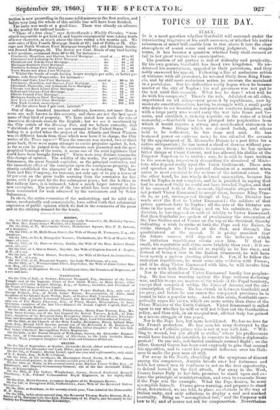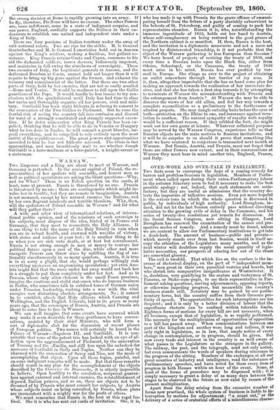TOPICS OF THE DAY.
ITALY.
IT is a moot question whether Garibaldi will succumb under the intoxicating fragrance of his swift successes, or whether his native robustness of mind will euablahini to rise above it into the dear atmosphere of sound sense and unerring judgment. In simple terms, it has become a question whether Italy shall succeed er fail in her great venture for emancipation. The position of all parties is full of difficulty and perplexity. By his own genius, Garibaldi has freed two kingdoms. He un- derstood his countrymen, appealed to their patriotism, and they nobly answered his appeal. Following a line of audacious action at variance with all precedent, he wrested Sicily from King Film- cis, and by still more audacioure action he overran the mainland in a postchaise. But his ditliculties really began when he became master of the city of- Naples ; his real greatness was not put to the test until that moment. What has he done i' what will be do with his conquests ? There's the rub. Adulated on all sides, importuned on all sides,—now pressed by republicans, now by moderate constitutionalists, having to struggle with a small party who desire to see founded an independent southern kingdom, and with a large party who would carry the war into Rome and Ve- netia, and establish a rieketty republic on the ruins of a tried monarchy,—Garibaldi has been plunged into perplexities from which it would require a strong and cool-headed statesman to escape. Some things whi,-.th are deemed foolish, and others held to be indiscreet, he has done and said. Ho has bestowed power on extreme men,. he has offended the savants by the appointment of M. Alexandre Dumas to a post fitter for a native antiquarian ; he has issued a shoal of decrees without pro- viding an irresistible executive to enforce them ; he has spoken bitter things of Count Cavour, and has allowed his dislike of the Emperor Napoleon to be visible; nay, he is said to have written to his sovereign, imperiously demanding the dismissal of Minis- ters, who depend really upon the Turin Parliament. These sets aunt speeches are held to portend disunion at a moment when union is most essential to the welfare of the national cause. On the other hand, he has wisely deferred annexation, because his work iu Naples is not complete, and he is justified in saying that had he annexed Sicily lie could not have invaded Naples, and that if he annexed both at this moment, diplomatic etiquette would not permit Victor Emmanuel to accept them, because King Fran- cis is, as yet, unconquered though at bay. The Dictator has made over the fleet to Victor Emmanuel ; the soldiers of that prince garrison forts in Naples ; all the acts of the Dictator are done in the name of the King ; and on his substitute, the pro- dictator, he has imposed an oath of fidelity to Victor Emmanuel. But then Garibaldi has spoken of proclaiming the annexation of the Two Sicilies and of Venice on the top of the Quirinal, thereby indicating a wish to strike at both the Pope and the Kaiser, to strike through the French at the first, and through the quadrilateral at the second. It is pretty manifest that his future success will depend on the influence which the unitarian republicans obtain over him. If that be small, his reputation will shine more brightly than ever ; if it ac- quire an ascendancy, he will set as rapidly as he has risen, and instead of being a star in the Italian firmament, he will have been merely a meteor ehooting athwart it. For, if he follow the unitarian republicans, he must come into collision with France, and if he drag 'Victor Emmanuel with him, he will involve him in a war with both those Powers.
Nor is the situation of Victor Emmanuel hardly less perplex. ing. He has been warring against the Pope without declaring war, and his troops are masters of the whole of the Papal territory, except that compris:ed within the Lines of Ancona and the cir- cumscription of Rome. He has struck in between Garibaldi and his prey, and before lie can annex the conquered provinces he is bound to take a popular vote. And in this crisis, Garibaldi ener- getically urges his views, which are more active than those of the Prime Minister of the Turin Cabinet. Victor Emmanuel is ealled upon to say whether he will or will not follow out -the Garibaldian policy, and thus risk, in an unequal war, all that Italy has gained in a severe struggle of two years. Nor M the Pope less, but more bewildered. He has no love for his French protectors. He has seen his army destroyed -by the soldiers of a Catholic prince who is not at war with him. " Wil- ling to wound, but yet afraid to strike," where his predecessors would have hurled an interdict, he consents to indite a diplomatic protest! On one side, red-hatted cardinals counsel flight ; on the other, General Goyon has been sent expressly to give that counsel his opposition, and to exert his personal influence over his Holt- ness to make the poor man sit still.
Far away in the North, chuckling at the symptoms of discord among the conquerors, Austria broods over her fortresses and holds her armed men in readiness to act on the first opportunity, to defend herself on the first attack. Far away in the West, France leaves Italy to her fate, promises to stand upon and en- force the principle of nonintervention, and even to evacuate Rome if the Pope sets the example. What the Pope desires, he must accomplish himself. France gives warning, and prepares to stead clear, determined, we are told, to place no obstacle in the way of Italian unity, and only solicitous to display a cool and marked neutrality. Brine.° an ' accomplished fact," and the Emperor's bow to it; and of course not ask for compensation. Nevertheleae
the strong division at Rome is rapidly growing into an army. If he fly, therefore, Pio None will have no excuse. The other Powers are, some indifferent, some in a state of indignant surprise, and one power, England, cordially supports the Italians in their en- deavours to establish one united and independent state under a King of Italy. There are four portions of Italian territory under the sway of anti-national rulers. Two are ripe for the sickle. M. le General Quatrebarbes and M. le General Lamoriciere hold out in Anoona against the King's soldiers, making a fruitless, but gallant re- sistance. King Francis retains Gaeta and Capua, summons to his -aid the disbanded soldiers, issues decrees, ludicrously impotent, and maintains in full swing the simulacra of sovereignty. These two enemies of Italy, the Legitimist generals at Ancona, and the dethroned Bourbon at Gaeta, cannot hold out longer than it will require to bring up big guns against the former, and exhaust the treasury and commissariat of the latter. But there are two other parts of Italy, held by her enemies, that are not so easily assailed —Rome and Venice. It would be madness to fall upon the Gallic guardians of the Pope. It would hardly be less insane to try con- clusions with the quadrilateral until Italy has had time to close her ranks and thoroughly organize all her powers, civil and mili- tary. Garibaldi has been right hitherto in refusing to consent to the annexation of the Two Sicilies to Piedmont. But he runs the fearful risk of seeing the country fall into confusion and discord for want of a strongly constituted and strongly supported execu- tive. If he defer annexation after King Francis has been ex- pelled, thinking that he will be able to do in Venetia or Hungary what he has done in Naples, he will commit a great blunder, im- peril everything, and be compelled to rely entirely upon the most entete of the republican sect. The great powers and opportunities accorded to him he has not hitherto misused. The crisis is fast approaching, and men breathlessly wait to see whether Joseph Garibaldi is a hero-madman or a hero-patriot, a knight-errant or a statesman.



























 Previous page
Previous page